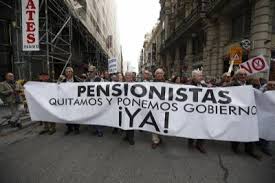Countdown to Brexit: 33 days – Updated advice to pensioners and citizens living abroad in a no-deal Brexit

If you are entitled to a UK state pension – you can claim it wherever you live in the world.
Those that live in the UK have their state pension ‘uprated’ every year in line with a ‘triple-lock’ – which means it rises by whichever is highest of: average earnings, inflation or 2.5%.
The triple-lock applies if you live in the EEA – comprising the other 27 EU, Iceland, Liechtenstein, Norway and Switzerland.
The Government has proposed changes to state pension rules:
- if Theresa May’s Brexit Withdrawal Agreement goes through – uprating will continue in the UK and EEA;
- a no-deal Brexit guarantees an uprate of state pension for people living in EEA countries in 2019 and 2020 only. After that, it will only uprate pensions if it has a ‘reciprocal arrangement’. This could be with the whole of the EU – or by individual countries such that their state pensioners living in the UK also receive annual upratings.
The Department for Work and Pensions have said that: “Insisting on reciprocal arrangements has been government policy for over 70 years – and will continue to be so.”
This is illustrated as the issue is already settled for people claiming the UK state pension in the Republic of Ireland and Switzerland –reciprocal arrangements with the UK have been agreed, with or without a Brexit deal. A list of countries with which the UK has reciprocal arrangements is included, below, in the background section.
The EU countries with the highest number of UK pension claimants in August 2018 was:
Ireland 140,000
Spain 110,000
France 70,000
Germany 50,000
Italy 35,000
Annuities or personal pensions paid from a UK-based firm may require the firm to make new arrangements, including the way that payment is made – and is required to contact you about it.
There is nothing in UK private occupational pensions legislation that prevents occupational pension schemes from making pension payments overseas. No change is expected as a result of the UK withdrawing from the EU.
Regarding residence status of UK citizens living in the UK in the event of a no-deal Brexit: the latest briefing from HM Government says that it: “can’t confirm that registering as a permanent resident will protect your status and rights in the country you are living in: this will depend on the approach that the EU and each EU Member State takes. You should keep in touch with your local authorities and be ready to cooperate with them once they confirm any action UK nationals may be required to take.”
Continuing education will depend on the “immigration requirements of the host Member State and/or the requirements of the educational institution you are studying at in” – including any required fees. UK citizens are advised to contact the host country government or education institution for advice.
The Government wants UK nationals to be able to stay and live in EU post-Brexit – and for their rights to employment, healthcare, education, benefits and services to be protected. In a no-deal Brexit, the UK will call on the EU – and its member countries – to continue their commitments and protect the rights of UK nationals living in EU countries.
However, UK nationals living in, working in, or visiting the EU may find that their access to healthcare in EU Member States will change after 29 March 2019. This will depend on decisions made by each country.
Any valid will made under UK law before the UK’s exit from the EU, including wills that apply to property situated in the EU, will remain valid under UK law. However, the effect of the will in relation to property abroad continues to be subject to the law of the country in which the property is situated.
Holders of UK driving licences who are resident in an EU country should exchange their UK licences for a driving licence from the EU country you are living in before 29 March 2019. If you haven’t exchanged your UK licence after our exit from the EU, you will be subject to the domestic laws of that country and how they treat non-EU licence holders – which could mean needing to retake your driving test locally.
The UK’s exit from the EU will not change any existing UK rules for inheritance tax. Inheritance tax is levied on transfers of worldwide assets by individuals domiciled in the UK, and transfers of UK assets by non-domiciled individuals.
Background
Advice and guidance to UK nationals living in the EU is regularly updated – most recently on pensions and annuities on 15 February 2019; and on general advice to UK citizens living in the EU in the event of a no-deal Brexit on 21 February 2019.
There are also detailed guides for each country that are updated as and when new information, for example as a result of UK-EU or bi-lateral negotiations take place.
The UK has agreements with some other countries to protect the social security rights of workers moving between the 2 countries – known as ‘bilateral agreements’ or ‘reciprocal agreements’.
If you live in one of the following countries and receive a UK State Pension, you will usually get an increase in your pension every year: Barbados; Bermuda; Bosnia-Herzegovina; Jersey; Guernsey; the Isle of Man; Israel; Jamaica; Kosovo; Macedonia; Mauritius; Montenegro; the Philippines; Serbia; Turkey; USA.
The UK has social security agreements with Canada and New Zealand, but you cannot get a yearly increase in your UK State Pension if you live in either of those countries.
References
https://www.gov.uk/guidance/uk-nationals-in-the-eu-benefits-and-pensions-in-a-no-deal-scenario
https://www.gov.uk/guidance/advice-for-british-nationals-travelling-and-living-in-europe
